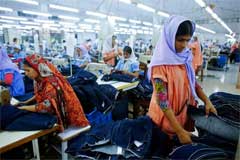From SCDigest's On-Target e-Magazine
- Dec. 17, 2014 -
Global Supply Chain News: Plans by Retailers and Apparel Companies to Improve Bangladesh Factory Safety Finally Moving to Action Phase
VF Corp, Walmart Backing Relatively Low Cost Loans to Suppliers
SDigest Editorial Staff
After the 2013 collapse of a building containing five apparel manufacturing companies that killed more than 1100 workers, intense scrutiny was placed on the outsourcing activities of global retailers and brand companies. The focus was largely on factory safety and the murky flows of orders to primary suppliers and then on to numerous sub-contractors, which were often invisible to the retailers and apparel companies. Many companies also vowed they would greatly step up inspections of apparel factories in the country and eliminate suppliers which had unsafe facilities.
And all that put at risk the growing apparel manufacturing sector in Bangladesh, which had risen to some $19 billion in exports for the country and a major source of its GDP.
SCDigest Says: |
 |
International inspectors estimate that around $400 million will be needed to fix nearly 2,000 Bangladeshi factories producing clothes for leading European and North American retailers. |
|
What Do You Say?
|
|
|
|
Reports of dangerous conditions in Bangladeshi apparel producers, especially related to risk of fire, came pouring in. The Bangladesh government passed some new laws relative to factory conditions, though how effective that move has been remains an open question.
In parallel, a group of mostly European retailers and apparel companies formed an alliance to provide funding for the improvement of factories in the country. Concerned about the legally binding nature of the Euro-led pact, which might have led to legal action against retailers and brand companies, Walmart, Gap and other US companies formed their own alliance to address the issues.
Now comes news the efforts really are moving forward, generally in the form of providing low cost loans to factory owners to improve conditions at their facilities.
The Alliance for Bangladesh Worker Safety, led by US firms including VF Corp in addition to Walmart and Gap, has established a mechanism that will give Bangladeshi factories access to the low-cost loans backed by a corporate guarantee.
The Alliance said last week that it had reached an agreement with the International Finance Corporation (IFC), the World Bank group’s private-sector arm, to facilitate the loans, the first of which have been disbursed over the past couple of weeks. Under the program, it appears that different US companies will back loans to specific Bangladeshi suppliers. For example, VF has said that it will back some $10 million in loans to finance safety modifications at the 90 or so Bangladeshi factories producing clothes for VF. Walmart is on a similar trajectory, and two other US companies are said to be close to a program with the IFC.
Levi Strauss recently announced its own program with the IFC. (See Levi Strauss Expands Ethical Sourcing Program to Offer Low-Cost Loans to Offshore Vendors.)
The Wall Street Journal reported this week on the case of Arunima Sportswear, a Bangladesh maker of apparel for VF, North Face and other Western customers, but which needed to make major improvements in safety-related areas such as fire doors, safety lights and automatic-sprinkler systems, to meet new inspection requirements.
(Sourcing and Procurement Article Continues Below)
|
The company last month secure a nearly $1 million loan from the IFC, at an interest rate of 5%, well below the unaffordable 18% or so Arunima would have had to pay for a bank loan.
 Overall, international inspectors estimate that around $400 million will be needed to fix nearly 2,000 Bangladeshi factories producing clothes for leading European and North American retailers. Overall, international inspectors estimate that around $400 million will be needed to fix nearly 2,000 Bangladeshi factories producing clothes for leading European and North American retailers.
Olaf Schmidt, an IFC official, called the loan mechanism "an efficient tool to resolve the issue of financing the corrective action plan" for the factories. He called it a "bold step" for retailers, given that many of them "have probably never done a corporate guarantee like this before."
As this US-centric program gets off the ground, the Euro-led consortium, called the Accord on Fire and Building Safety in Bangladesh, is taking a different approach. First, unlike the Alliance effort, the Accord has partnered in the effort with global workers’ unions IndustriALL and Uni.
In addition, participating brands are committed to sufficient funding for factory upgrades, and the Accord leadership includes stronger worker representation.
October, the European-led Accord announced it had finished inspecting nearly 1,100 of the approximately 1,600 factories that make clothes for its members while the Alliance said it had checked roughly 600 factories that its members use.
The Accord also says its member brands were also considering the IFC loan program, and although it had not yet been "operationalized" with Accord signatories, "a fair number of Accord signatories have shown an interest and are in the process of working out the arrangements."
Just how much will US and Euro companies spend to improve factory safety in Bangladesh and perhaps someday soon elsewhere? That remains the big question, as it took nearly 18 months to get a loan program off the ground.
What is your reaction to this new loan program? Is it enough? Let us know your thoughts at the Feedback button (email) or section (web form) below.

|